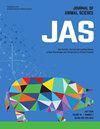紫堇和益母草治疗牛子宫内膜炎的疗效研究。
IF 2.9
2区 农林科学
Q1 AGRICULTURE, DAIRY & ANIMAL SCIENCE
引用次数: 0
摘要
奶牛子宫内膜炎已成为动物生殖健康领域的一个重要挑战。目前,主要的治疗方法是使用抗生素。然而,抗生素可诱导病原菌产生耐药性和药物残留。中药治疗奶牛子宫内膜炎有较好的优势。本研究旨在探讨紫堇和益母草对奶牛子宫内膜炎的治疗作用。首先建立脂多糖诱导的细胞炎症模型,评价其抗炎作用,然后构建子宫内膜炎大鼠模型,初步评价其治疗效果。随后,基于质谱和网络药理学,探讨了中药治疗子宫内膜炎的机制。最后,通过临床观察来评价中药对牛子宫内膜炎的治疗效果。结果显示,与LPS组相比,TCMF显著降低了IL-1β、IL-6、IL-8和IL-18 mRNA水平(P < 0.001)。与模型组比较,中药复方显著降低大鼠子宫指数和细菌负荷(P < 0.05)。此外,TCMF显著降低IL-1β、IL-6和TNF-α蛋白水平(P < 0.001),降低TNF、PTGS2和CASP3蛋白表达水平(P < 0.01)。与牛子宫内膜炎组相比,TCMF显著降低了子宫分泌物评分、pmn数量和细菌负荷(P < 0.001),显著提高了血液中白蛋白(ALB)和超氧化物歧化酶(SOD)水平(P < 0.01),奶牛子宫内膜炎治愈率可达80%以上。代谢组学分析显示,治疗奶牛血清中皮质醇水平上调。上述结果表明,紫堇和益母草对子宫内膜炎具有积极的治疗作用,并通过TNF信号通路发挥作用,可在一定程度上替代抗生素。本文章由计算机程序翻译,如有差异,请以英文原文为准。
Study on the therapeutic effect of Viola yedoensis and Leonurus japonicus on bovine endometritis.
Endometritis in dairy cows has become a key challenge in the field of animal reproductive health. Currently, the primary treatment method is using antibiotics. However, antibiotic could induce pathogen resistance and the presence of drug residues. Traditional Chinese medicine has good advantages in the treatment of endometritis in dairy cows. This study aims to investigate the therapeutic effect of Viola yedoensis and Leonurus japonicus (TCMF) on endometritis in dairy cows. Firstly, LPS-induced cell inflammation model was established to evaluate the anti-inflammatory effects of TCMF, and then rat model of endometritis was constructed to preliminarily assess its therapeutic effects. Subsequently, based on mass spectrometry and network pharmacology, the mechanisms of TCMF in treating endometritis was investigated. Finally, clinical observations were performed to assess the therapeutic effects of TCMF on bovine endometritis. The results showed that TCMF significantly reduced IL-1β, IL-6, IL-8, and IL-18 mRNA levels compared to the LPS group (P < 0.001). Compared to the model group, TCMF significantly reduced the uterine index and bacterial load in rats (P < 0.05). Additionally, TCMF significantly reduced IL-1β, IL-6 and TNF-α protein levels (P < 0.001) and decreased the protein expression levels of TNF, PTGS2, and CASP3 (P < 0.01). Compared to the bovine endometritis group, TCMF significantly reduced the scoring of uterine discharge, the number of PMNs, and the bacterial load (P < 0.001), while increasing the levels of albumin (ALB) and superoxide dismutase (SOD) in the blood (P < 0.01), the cure rate of endometritis in dairy cows could reach up to 80%. Metabolomics analysis revealed upregulation of cortisol in the serum of treated cows. These results indicated that Viola yedoensis and Leonurus japonicus had a positive therapeutic effect on endometritis, and exerted effect through TNF signaling pathway, which could replace the antibiotics in a certain extent.
求助全文
通过发布文献求助,成功后即可免费获取论文全文。
去求助
来源期刊

Journal of animal science
农林科学-奶制品与动物科学
CiteScore
4.80
自引率
12.10%
发文量
1589
审稿时长
3 months
期刊介绍:
The Journal of Animal Science (JAS) is the premier journal for animal science and serves as the leading source of new knowledge and perspective in this area. JAS publishes more than 500 fully reviewed research articles, invited reviews, technical notes, and letters to the editor each year.
Articles published in JAS encompass a broad range of research topics in animal production and fundamental aspects of genetics, nutrition, physiology, and preparation and utilization of animal products. Articles typically report research with beef cattle, companion animals, goats, horses, pigs, and sheep; however, studies involving other farm animals, aquatic and wildlife species, and laboratory animal species that address fundamental questions related to livestock and companion animal biology will be considered for publication.
 求助内容:
求助内容: 应助结果提醒方式:
应助结果提醒方式:


